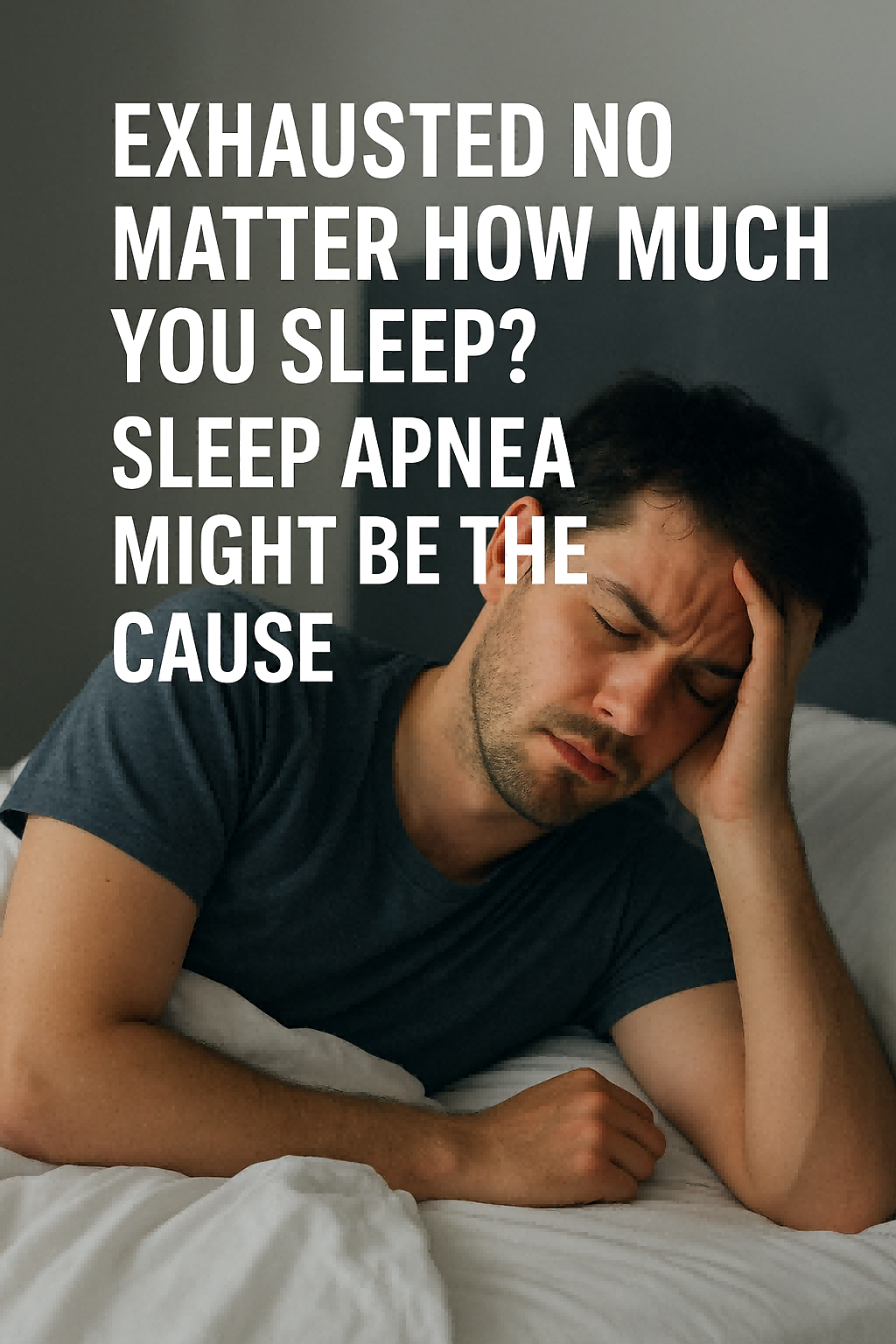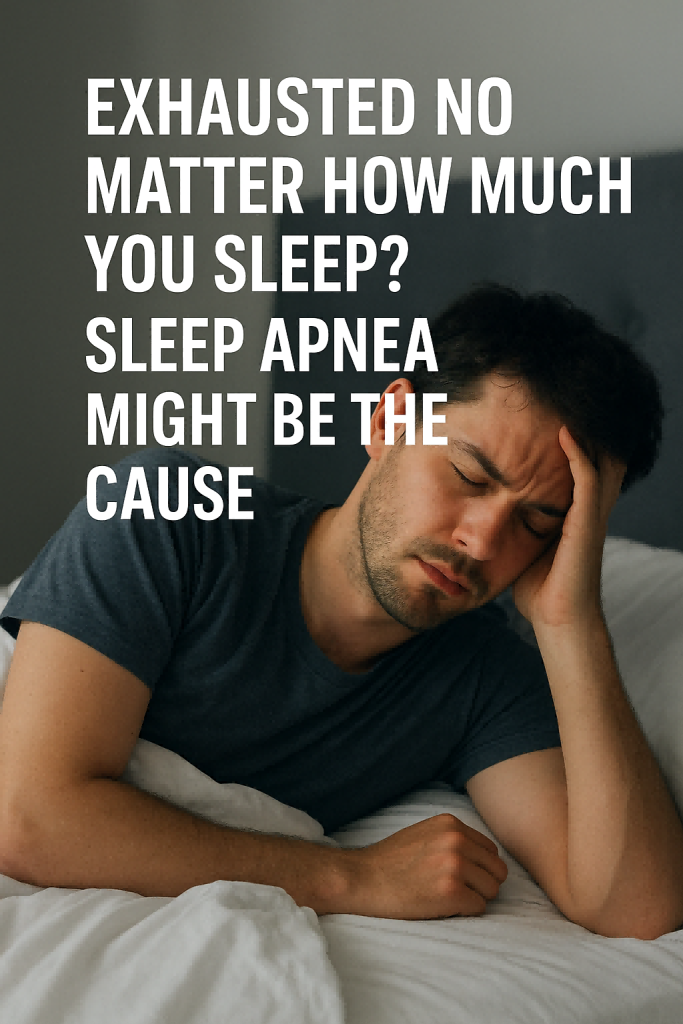Exhausted No Matter How Much You Sleep? Sleep Apnea Might Be the Cause


Introduction: The Hidden Link Between Fatigue and Sleep Apnea
Do you wake up every morning feeling like you barely slept—even after spending 7–9 hours in bed? If so, you’re not alone. Millions of people worldwide complain about being exhausted no matter how much they sleep. A hidden culprit behind this constant fatigue could be sleep apnea, a common but often undiagnosed sleep disorder that disrupts the quality of rest.
In this article, we’ll explore how sleep apnea robs you of restorative sleep, its symptoms, health risks, and the treatments that can help you reclaim your energy and vitality.
Understanding Sleep Apnea
What Is Sleep Apnea?
Sleep apnea is a sleep disorder in which breathing repeatedly stops and starts during the night. These pauses can last from a few seconds to over a minute, preventing your body from reaching deep, restorative sleep.
Types of Sleep Apnea (Obstructive, Central, Complex)
- Obstructive Sleep Apnea (OSA): Caused by relaxed throat muscles blocking airflow.
- Central Sleep Apnea (CSA): Occurs when the brain fails to send proper signals to muscles controlling breathing.
- Complex Sleep Apnea: A combination of both OSA and CSA.
How Sleep Apnea Disrupts Restorative Sleep
Even if you’re technically “asleep,” your body keeps waking up briefly to resume breathing. These micro-arousals fragment your sleep cycles, leaving you drained despite spending hours in bed.
Signs and Symptoms of Sleep Apnea
Constant Fatigue Despite Sleeping All Night
The hallmark of sleep apnea is waking up unrefreshed. No matter how long you sleep, the lack of deep rest makes you feel perpetually tired.
Loud Snoring and Interrupted Breathing
Snoring is one of the most noticeable warning signs. In fact, many people first learn about their condition because a partner notices their pauses in breathing.
Morning Headaches and Brain Fog
Oxygen deprivation during the night can lead to dull morning headaches and difficulty focusing throughout the day.
Mood Changes and Irritability
Sleep apnea has been linked to irritability, anxiety, and even depression due to poor-quality sleep.
Health Risks Linked to Untreated Sleep Apnea
Cardiovascular Complications
Untreated sleep apnea increases the risk of high blood pressure, heart attacks, and strokes.
Weight Gain and Metabolic Disorders
Interrupted sleep alters hormone regulation, increasing appetite and leading to weight gain—further worsening the condition.
Impact on Mental Health
Chronic fatigue and lack of oxygen can contribute to memory problems, depression, and reduced productivity.
Causes and Risk Factors of Sleep Apnea
Lifestyle and Environmental Triggers
Poor diet, smoking, and alcohol use can increase the likelihood of airway blockages.
Genetic and Biological Factors
A family history of sleep apnea or having a narrow airway raises your risk.
Age and Gender Considerations
Men and older adults are more prone, although post-menopausal women are increasingly affected.
How Sleep Apnea Is Diagnosed
Sleep Studies (Polysomnography)
A hospital-based sleep study monitors brain activity, breathing, and oxygen levels overnight.
Home Sleep Apnea Tests
For milder cases, at-home devices can track breathing patterns and oxygen drops.
Treatment Options for Sleep Apnea
Lifestyle Modifications and Weight Management
Losing weight, exercising regularly, and changing sleep positions can help reduce symptoms.
CPAP Therapy: The Gold Standard
Continuous Positive Airway Pressure (CPAP) machines keep the airway open by delivering a constant stream of air.
Oral Appliances and Surgical Options
Custom mouthpieces and, in some cases, surgical procedures can improve airflow and reduce symptoms.
Preventing and Managing Sleep Apnea at Home
Healthy Sleep Hygiene Practices
Going to bed and waking up at consistent times helps regulate your sleep cycles.
Dietary and Exercise Adjustments
Avoiding heavy meals before bedtime and incorporating moderate exercise can enhance sleep quality.
Reducing Alcohol and Tobacco Use
Both alcohol and tobacco relax airway muscles, worsening apnea episodes.
FAQs About Sleep Apnea
Q1: Can sleep apnea go away on its own?
No. Sleep apnea typically requires medical intervention or lifestyle changes for improvement.
Q2: Does everyone who snores have sleep apnea?
Not necessarily. While snoring is a common symptom, not all snorers have sleep apnea.
Q3: Can children have sleep apnea?
Yes, children can develop sleep apnea, often linked to enlarged tonsils or obesity.
Q4: How dangerous is untreated sleep apnea?
Very dangerous. It raises the risk of heart disease, diabetes, stroke, and accidents due to daytime fatigue.
Q5: Is CPAP the only treatment option?
No. Oral devices, positional therapy, surgery, and lifestyle changes can also help.
Q6: How do I know if I need a sleep study?
If you experience constant fatigue, snoring, and witnessed breathing pauses, consult a sleep specialist.
Conclusion: Regain Your Energy by Tackling Sleep Apnea
If you’re exhausted no matter how much you sleep, don’t ignore the signs. Sleep apnea is more than just snoring—it’s a serious medical condition that impacts your health, energy, and quality of life. Fortunately, with proper diagnosis and treatment, you can restore restful sleep and wake up feeling refreshed.
For more information, visit the American Sleep Apnea Association.
















